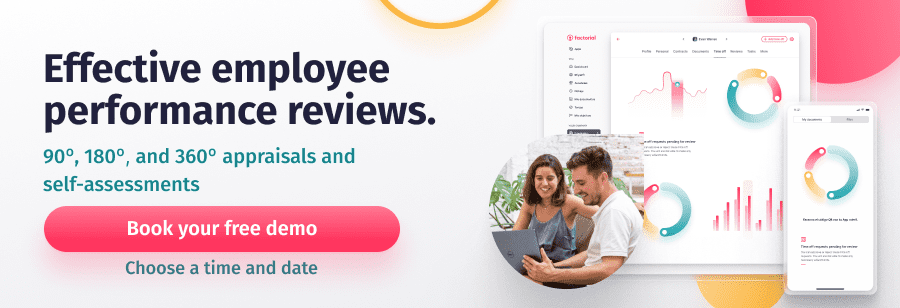While we’re all used to performance evaluations, self appraisals are a relatively new part of performance reviews. But using both together can improve your team’s experience and satisfaction with their roles as they get the chance to reflect on their performance.
Let’s go through what a self appraisal is, the pros and cons of self appraisals vs management appraisals and some example questions to help you create an impactful self appraisal process for your leadership team to use with their staff.
What is a Self Appraisal?
A self appraisal, sometimes called an employee self assessment, is a performance review that your team members conduct themselves. It’s an opportunity for your staff to self reflect on their accomplishments, strengths and weaknesses, and overall performance in the past year or since their last review.
Self appraisals can help employees and managers set goals that align with the individual’s career development aims as well as your organisation’s objectives. But for managers to get a true reflection of how their team members feel about their job performance, they need to ensure that their teams can be open and honest about past failures and challenges they’ve faced.
What is the Objective of a Self Appraisal?
The objective of a self appraisal is to empower employees to take control of their own performance. It allows them to critically assess their work and consider what they could do to contribute towards their team’s or the company’s collective goal.
While a traditional performance evaluation tends to remove an employee’s sense of autonomy, the self appraisal process shows individuals that their opinions matter; it allows them to offer their own perspective on their skill set and gives greater insight into their career progression goals.
Self Appraisal vs. Manager Appraisal: Pros and Cons

As with any HR technique, there are pros and cons of employee self evaluation vs the manager appraisal process. Let’s go through some here:
Self appraisals
Pros
- Gives individuals the chance for self reflection on their work
- Allows employees to bring up challenges they’re facing
- Gives managers examples of high or low performance to help them set new goals
Cons
- Employees may not be honest enough, especially in their first self appraisal
- Some individuals may be self deprecating, leaving them unable to recognise their achievements or progression opportunities
- Relies on employees submitting their evaluations in a timely manner – if they don’t, it creates more work for the manager
Manager appraisals
Pros
- Easy to align employee performance with company goals
- Clarifies expectations between employees and management
- Allows the manager to offer constructive feedback
Cons
- Some of the accomplishments an employee has made could be missed
- Managers aren’t likely to be aware of every challenge an employee is facing
- May not take into account someone’s career progression goals
The best way forward is to use both self appraisals and manager appraisals together. That way, you get a holistic view of the employee’s performance from both perspectives. Just make sure that the manager and employee both offer specific examples of achievements and weaknesses to support their appraisals and to avoid subjectivity.
Benefits of Self Appraisals

There are plenty of benefits of self appraisals to both employees and their managers. While they help employees to feel heard, they help management to offer effective feedback based on an employee’s values, goals and motivations.
Benefits to employees
- Gives them ownership: Taking ownership of their performance evaluation helps employees to feel empowered and in control.
- Helps develop problem solving skills: No one wants to admit a weakness without having an answer for it. Employees will naturally offer examples of how they can improve or develop a new skill to plug a gap.
- Builds self-awareness: Employees will be able to manage stress better, have better relationships with other team members and manage time more efficiently.
- Increases job satisfaction and motivation: A 2010 study found that employees were more likely to be satisfied and motivated in their jobs because they have a voice during the evaluation process.
Benefits to managers
- Gives insight into team members: Self evaluations help leaders learn about their staff.
- Enables them to identify skills gaps: Managers can offer further training based on what the employee says.
- Improves employee relations: Individuals who are active participants in their appraisals will have better relationships with their managers because their opinions, values and motivations have been listened to.
- Creates a culture of trust and engagement: Staff that trust and feel trusted by their manager will be more engaged and committed to company goals, and will continue to develop their self reflection skills.
Self Appraisal Example Questions
Here are just a few questions you could use in your self evaluation form:
- What makes you great at your job?
- Are there any tasks or responsibilities you’ve taken on that aren’t included in your job description?
- How, where and when do you feel most productive?
- What do you like most/least about your role?
- What goals have you met/haven’t you met since your last review?
- What can we do to help you reach your career development goals?
- What can we do to improve your motivation and satisfaction in your role?
Download our self assessment template for more example questions and guidance on how to support your employees’ professional development.
When to Carry Out a Self Appraisal
It makes sense to carry out a self appraisal during your normal performance review period. You should carry out performance reviews at least annually, but some organisations find that doing them more regularly, for example every 6 months, helps to keep everyone on track with their targets.
You could also opt to carry out a more informal review every 6 months to check on your team’s progress before the next performance review.
Performance Management with Factorial
Create personalised self appraisals for your team members with Factorial’s performance management software. Get more out of your performance review process by making data-driven decisions, encouraging and monitoring training and nurturing your team’s competencies with Factorial’s all-in-one HR software.



